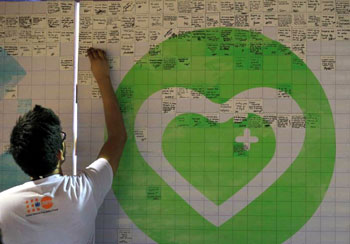10 facts about the world's population
Posted Date: 10/07/2018 World Population Day is celebrated every year to raise awareness about rapid population growth
World Population Day is celebrated every year to raise awareness about rapid population growth-
The world's population totals 7.6 billion people and is expected to grow to nearly 10 billion by the middle of this century before levelling off at around 11.2 billion by the end.
-
More people live in urban than rural areas, with 55 percent residing in urban areas in 2018, compared to 30 percent in 1950. By 2050 this proportion is expected to reach approximately 70 percent.
-
The most urbanised regions are North America (with 82 percent of people living in urban areas), Latin America and the Caribbean (81 percent), Europe (74 percent) and Oceania (68 percent).
-
Asia is about 50 percent urbanised, while Africa is still predominantly rural (43 percent).
-
Africa and Asia are home to nearly 90 percent of the world's rural population, with India having the largest number of people living in rural areas (893 million), followed by China (578 million).
-
Tokyo is the world's largest city with 37 million inhabitants, followed by Delhi with 29 million and Shanghai with 26 million people.
- The world is ageing rapidly. People aged 60 and older make up 12.3 per cent of the global population, and by 2050, that number will rise to almost 22 percent.
REPRODUCTIVE RIGHTS
-
An estimated 214 million women in developing countries have an unmet need for modern contraception, with women in the poorest 20 per cent of the population having the least access to sexual and reproductive health services.
-
Nearly half of the estimated 56 million abortions carried out worldwide each year are unsafe, leading to the deaths of at least 22,800 women every year, due to a combination of lack of access to contraception, strict laws on abortion and stigma around terminations.
- 95 percent of the world's births among adolescents girls occur in developing countries.
Other Latest News
Updated Date: 19/01/2024
பிரித்தானியா வாழ் சாதனைப்பெண்களுக்கான அங்கீகாரத்துடன் தாயகப் பெண்களை வலுவூட்டும் சுடரி விருதுகள் 2023.
Updated Date: 15/05/2020
The infection rate in the UK has gone up and is close to the point where the virus starts spreading rapidly, government scientific advice says.
Updated Date: 31/07/2018
The UK Department for International Development (DFID) Secretary of State Penny Mordaunt MP has announced a range of new initiatives to help improve the economic opportunities as well as health and education outcomes for people with disabilities living in low and middle-income countries.
Updated Date: 20/06/2018
Sameera Al Salam folds a discarded piece of newspaper into a long strip then loops it round her finger to form a tight circle, the first stage of making the upcycled handbags, trays and bowls the Syrian refugee hopes will help her earn a living.
Updated Date: 20/06/2018
Hard-working Vasantamma Kumar had to pawn her jewellery and take out two loans to ensure her children were back in class when term began this week.
Updated Date: 14/06/2018
Wide-ranging report from Charities Aid Foundation analyses likely impacts AI will have for civil society and the work of charities, outlines emerging challenges and opportunities to adopt ‘AI for good’.
Updated Date: 13/07/2012
John Rankin met 200 Catholic Tamil refugees forced to live in a jungle with nothing. They had been driven out of their village more than 20 years ago during the civil war. The high commissioner plans to discuss their plight with the Sri Lanka government.
Updated Date: 24/06/2012
A global gathering took place in Rio de Janeiro on the anniversary of the Earth Summit of 1992, which produced a global treaty on climate change and a landmark commitment to protect biodiversity.
Updated Date: 21/09/2011
Wearing a visor and a protective vest over grey fatigues tucked into black military boots, former housewife S. Dishanty crawls on her hands and knees through dense bush, slowly inching forward and methodically scanning the ground.
Updated Date: 20/03/2011
Researchers from Netherlands find that there is a link between the use of Marijuana and psychosis. Many studies have also identified an association between marijuana use and an increased risk of developing mental illness.
Updated Date: 03/03/2008
One thousand fifty seven cataract eye surgeries were performed free of charges at the Kuwait Hospital in Puttakam in February 2008, a not-for-profit health care institution established by the Sri Lanka Jama'ath e Islami with the sponsorship of Zakat House, Kuwait.










